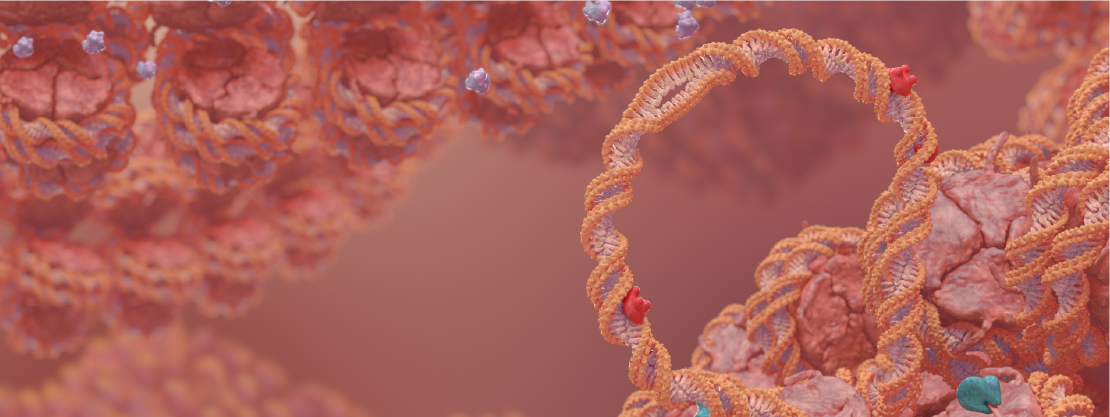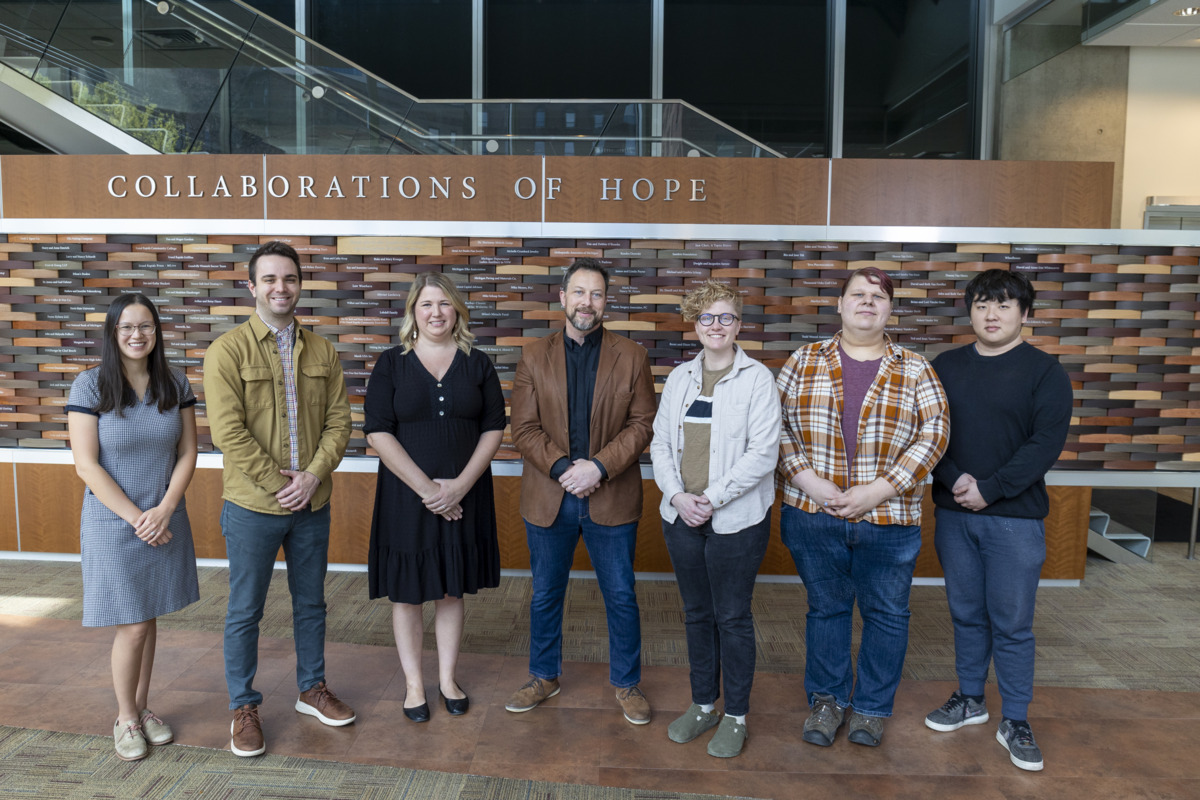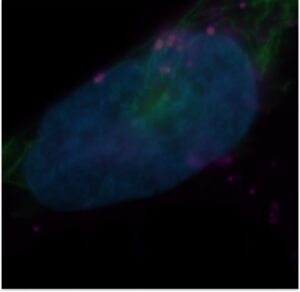Triche
Laboratory
 Translational Biological Informatics
Translational Biological Informatics
Acute myeloid leukemia (AML) is an aggressive blood cancer with dismal survival rates and extreme variability from patient to patient. This poses a serious challenge to the development of effective new therapies.
After a decades-long drought, the Food and Drug Administration (FDA) approved four new drugs for the disease in 2017. One of these, Idhifa (enasidenib), resulted directly from discoveries in major genomic profiling projects. A transformative drug was brought to bear in some of the worst-prognosis cases of the disease, by combining functional studies with insight from data-intensive molecular profiling. A New England Journal of Medicine editorial heralded the first of these studies as “the beginning of the end of the beginning”—as a chapter closed on pure profiling studies, a new chapter has opened, where large-scale clinical trials are wedded to deep characterization of patients and their responses.
In this new chapter, perhaps best exemplified by the genetic diversity of leukemia both between and within patients, there is no one cure for cancer—there are thousands. As novel agents prove their worth, a new problem is emerging: how can we couple the statistical rigor of randomized trials—a foundational tool of modern medicine—with the recognition that what we have long treated as a single disease in fact contains dozens?
The Triche Laboratory is focused on reconciling these opposing forces. Quick-to-fail early trial designs, enriched for specific patients with a high probability of response, can hasten the real-world testing of new drugs, which in turn are prioritized by shared molecular phenotypes. Discovering groups of patients whose disease shares molecular vulnerabilities, regardless of genotype or morphology, is the domain of statistical learning, and in this domain, it is an open research question how best to quantify uncertainty.
Ultimately, the randomized clinical trial provides the most powerful evidence in medicine, but trials are expensive, slow, and present unique ethical challenges, especially in children. Interpretable and rigorous statistical approaches are required; sick children will never be entrusted to “black box” machine learning approaches by their physicians.
We believe that cancers of the blood can serve as a model for more genomically and physically complex solid tumors, and we believe that insights from pediatric disease can impact both the understanding and treatment of adult disease. Children are not just small adults; the evolutionary history of pediatric disease is necessarily different from that in adults. The quiet genomic landscapes of pediatric cancer forces us to look closely, and in doing so, we can uncover subtle but fundamental forces shaping malignant evolution. For every malignant cell, a premalignant cell is among its ancestors, with a tiny yet crucial difference marking the change.
Cancers of the blood happen to be the best characterized in this respect, with clonal hematopoiesis (a loss of diversity in the millions of blood cells produced every minute) being an active topic of discussion: when does prevention become hypochondria? This, too, will eventually yield to analysis, with (one hopes) useful lessons for other types of cancer. Though our primary expertise is in hematological (blood) cancers, we also collaborate broadly with physicians to study a variety of pediatric solid tumors, to understand how liquid tumor biology can illuminate solid tumor treatment, and where fundamental differences prevent this.
Visit us on Github!
GithubNews
Learn More
VAI graduate student earns prestigious American Society of Hematology award

Chan Zuckerberg Initiative grant to fuel computing projects at Van Andel Institute, Grand Valley State University

Coriell Institute for Medical Research, Van Andel Institute awarded estimated $12.4 million SPORE grant from National Cancer Institute
Our Impact
We’re raising thousands to save millions.
We’re turning hope into action for the millions of people around the world affected by diseases like cancer and Parkinson’s. Find out how you can help us make a difference.
- 122 peer-reviewed papers published in 2024, 63 of which were in high-impact journals
- 15 VAI-SU2C Epigenetics Dream Team clinical trials launched to date
- 10 clinical trials co-funded by VAI & Cure Parkinson's (out of 41 total International Linked Clinical Trials Program trials)
Tim Triche, Jr., Ph.D.
Associate Professor, Department of Epigenetics
Faculty Advisor, Bioinformatics and Biostatistics Core
Areas of Expertise
Leukemia, biostatistics, computational biology, next-generation sequencing
Biography
Dr. Tim Triche, Jr., earned his A.B. in chemistry from Cornell University, followed by an M.S. in biostatistics and a Ph.D. in statistical genetics from University of Southern California. Prior to joining Van Andel Institute’s Department of Epigenetics in 2017, he served as a postdoctoral fellow in the Jane Anne Nohl Division of Hematology at USC’s Norris Comprehensive Cancer Center, where he studied the roles of cellular and immune senescence in benign and malignant blood disorders, including acute myeloid leukemia and pediatric leukemia. He has been a key member of The Cancer Genome Atlas Research Network since 2011, and has contributed to more than a dozen of the consortium’s publications in journals such as Nature and Cell. As a statistician with interests in both basic and translational research, Dr. Triche’s work focuses on improving patient outcomes and quality of life through the design of randomized clinical trials, which are critical components of moving promising therapies from the lab to the doctor’s office.
Memberships
American Society of Hematology
Global Alliance for Genomic Health
American Association for Cancer Research
International Society of Paediatric Oncology
SELECTED PUBLICATIONS
Harmon LM, Hattig ZS, Huang YP, Beckford C, Farrar J, Pollard JA, Zarnegar-Lumley S, Ma X, Ries RE, Meshinchi S, Godley LA, Triche TJ Jr. 2025. Germline variant warrants universal genetic testing in pediatric myeloid leukemia. bioRxiv.
Buteyn AJ, LaMantia SJ, Burke CG, Sartori VJ, Deering-Gardner E, DeBruine ZJ, Kamarudin D, Chandler DP, Monovich AC, Perez MW, Yi JS, Ries RE, Alonzo TA, Ryan RJH, Meshinchi S, Triche TJ Jr. 2025. EZH2-driven immune evasion at disease presentation defines a targetable high-risk subset of acute leukemia exemplified by t(16;21) FUS::ERG AML. bioRxiv.
Madaj Z, Ding M, Khoo C, Tokarski E, Fagnocchi L, PERMUTE, Li Z, Riordan J, Pospisilik JA, Nadeau JH, Lary CW, Triche TJ Jr. 2025. BifurcatoR: A framework for revealing clinically actionable signal in variance masquerading as noise. bioRxiv.
Hemberg M, Marini F, Ghazanfar S, Al Ajami A, Abassi N, Anchang B, Benayoun BA, Cao Y, Chen K, Cuesta-Astroz Y, DeBruine Z, Dendrou CA, De Vlaminck I, Imkeller K, Korsunsky I, Lederer AR, Li JJ, Meysman P, Miller CL, Mullan KA, Ohler U, Panwar P, Patikas N, Schuck J, Siu JHY, Triche TJ Jr, Tsankov A, van der Laan SW, Yajima M, Yang J, Zanini F, Jelic I. 2025. Insights, opportunities, and challenges provided by large cell atlases. Genome Biol 26:358.
Panzeri I, Fagnocchi L, Apostle S, Tompkins M, Wolfrum E, Madaj Z, Hostetter G, Liu Y, Schaefer K, Yang C-H, Bergsma A, Drougard A, Dror E, PERMUTE, Chandler DP, Schramek D, Triche TJ Jr., Pospisilik JA. 2025. TRIM28-dependent developmental heterogeneity determines cancer susceptibility through distinct epigenetic states. Nat Cancer.
Jang HJ, Urrutia G, Orskov AD, Kim HJ, Nelson SA, Nguyen AV, Lee H, Burgos RS, Johnson BK, Wegener M, Becker K, Adams M, Sheridan R, Ramjan ZH, Givan SA, Zebley CC, Youngblood BA, Issa JPJ, Topper MJ, Baylin SB, Baer MR, Triche TJ Jr., O’Connell CL, Gronbaek K, Jones PA. 2024. Bone marrow microenvironment signatures associate with patient survival after guadecitabine and atezolizumab therapy in HMA-resistant MDS. bioRxiv.
Zhou W, Johnson BK, Morrison J, Beddows I, Eapen J, Katsman E, Semwal A, Habib W, Heo L, Laird PW, Berman B, Triche Jr TJ, Shen H. 2024. BISCUIT: an efficient, standards-compliant tool suite for simultaneous genetic and epigenetic inference in bulk and single-cell studies. Nuc Acids Res 52(6):e32.
Unterman I, Avrahami D, Katsman E, Triche Jr. TJ, Glaser B, Berman BP. 2024. CelFiE-ISH: a probabilistic model for multi-cell type deconvolution from single-molecule DNA methylation haplotypes. Genome Biol 25:151.
Nguyen N, Carpenter KA, Ensing J, Gilliland C, Rudisel EJ, Mu EM, Thurlow KE, Triche Jr. TJ, Grainger S. 2024. EGFR-dependent endocytosis of Wnt9a and Fzd9b promotes β-catenin signaling during hematopoietic stem cell development in zebrafish. Sci Sig 17(832).
Abla O, Ries RE, Triche Jr TJ, Gerbing RB, Hirsch B, Raimondi S, Cooper TM, Farrar JE, Buteyn N, Harmon LM, Wen H, Deshpande AJ, Kolb EA, Gamis AS, Aplenc R, Alonzo T, Meshinchi S. 2024. Structural variants involving MLLT10 fusion are associated with adverse outcomes in pediatric acute myeloid leukemia. Blood Adv.
Tucker DW, Pangal DJ, Du R, Gogia AS, Tafreshi A, Ruzevick J, Hurth KT, Triche Jr TJ, Micko A, Carpten JD, Shiroishi MS, Carmichael JD, Rhie SK, Zada G. 2023. Validation of Myc-associated protein X (MAX) regulation in growth hormone secreting and nonfunctional pituitary adenoma. PLoS One 18(4):e0284949.
Underwood A, Rasicci DT, Hinds D, Mitchell JT, Zieba JK, Mills J, Arnold NE, Cook TW, Moustaqil M, Gambin Y, Sierecki E, Fontaine F, Vanderweele S, Das AS, Cvammen W, Sirpilla O, Soehnlen X, Bricker K, Alokaili M, Green M, Heeringa S, Wilstermann AM, Freeland TM, Qutob D, Milsted A, Jauch R, Triche Jr. TJ, Krawczyk CM, Bupp CP, Rajasekaran S, Francois M, Prokop JW. 2023. Evolutionary landscape of SOX genes to inform genotype-to-phenotype relationships. Genes 14(1):222.
Bertrums EJM, Smith JL, Harmon L, Ries RE, Want YCJ, Alonzo TA, Menssen AJ, Chisholm KM, Leonti AR, Tarlock K, Ostronoff F, Pogosova-Agadjanyan EL, Kaspers GJL, Hasle H, Dworzak M, Walter C, Muhlegger N, Moreiro C, Pardo L, Hirsch B, Raimondi S, Cooper TM, Aplenc R, Gamis AS, Kolb EA, Farrar JE, Stirewalt D, Ma X, Shaw TI, Furlan SN, Eidenschink Brodersen L, Loken MR, van den Heuvel-Eibrink MM, Zwaan M, Triche Jr TJ, Goemans BF, Meshinchi S. 2023. Comprehensive molecular and clinical characterization of NUP98 fusions in pediatric acute myeloid leukemia. Haematologica.
Farrar JE, Smith JL, Othus M, Huang BJ, Wang YC, Ries R, Hylkema T, Pogosova-Agadjanyan EL, Challa S, Leonti A, Shaw TI, Triche Jr TJ, Gamis AS, Aplenc R, Kolb EA, Ma X, Stirewalt DL, Alonzo AT, Meshinchi S. 2023. Long noncoding RNA expression independently predicts outcome in pediatric acute myeloid leukemia. J Clin Oncol.
Dozmorov MG, Mu W, Davis ES, Lee S, Triche Jr TJ, Phanstiel DH, Love MI. 2022. CTCF: An R/bioconductor data package of human and mouse CTCF binding sites. Bioinform Adv 2(1):vbac097.
Huang BJ, Smith JL, Farrar JE, Wang Y-C, Umeda M, Ries RE, Leonti AR, Crowgey E, Furlan SN, Tarlock K, Armendariz M, Liu Y, Shaw TI, Wei L, Gerbing RB, Cooper TM, Gamis AS, Aplenc R, Kolb EA, Rubnitz J, Ma J, Klco JM, Ma X, Alonzo TA, Triche Jr TJ, Meshinichi S. 2022. Integrated stem cell signature and cytomolecular risk determination in pediatric acute myeloid leukemia. Nat Commun 13(1):5487.
Lee BD, Gitter A, Greene CS, Raschka S, Maguire F, Titus AJ, Kessler MD, Lee AJ, Triche Jr TJ, Boca SM. 2022. Ten quick tips for deep learning in biology. PLoS Comput Biol 18(3):e1009803.
Neman J, Franklin M, Madaj Z, Deshpande K, Triche Jr TJ, Sadlik G, Carmichael JD, Chang E, Yu C, Strickland BA, Zada G. 2022. Use of predictive spatial modeling to reveal that primary cancers have distinct central nervous system topography patterns of brain metastasis. J Neurosurg 136(1):88–96.
Wilson SL, Shen SY, Harmon L, Burgener JM, Triche Jr T, Bratman SV, De Carvalho DD, Hoffman MM. 2022. Sensitive and reproducible cell-free methylome quantification with synthetic spike-in controls. Cell Rep Methods 2(9):100294.
Yang CH*, Fagnocchi L*, Apostle S, Wegert V, Casani-Galdón S, Landgraf K, Panzeri I, Dror E, Heyne S, Wörpel T, Chandler DP, Lu D, Yang T, Gibbons E, Guerreiro R, Brás J, Thomasen M, Grunnert LG, Vaag AA, Gillberg L, Grundberg, E, Conesa A, Körner A, PERMUTE, Pospisilik JA. 2022. Independent phenotypic plasticity axes define distinct obesity subtypes. Nat Metab.
*Co-first authorship
**Highlighted in News & Views
***Dr. Triche is part of PERMUTE
Bolouri H, Ries R, Pardo L, Hylkema T, Zhou W, Smith JL, Leonti A, Loken M, Farrar JE, Triche Jr TJ, Meshinchi S. 2021. A B-cell development gene regulatory network is activated in infant AML. PLOS One.
Neman J, Franklin M, Madaj Z, Deshpande K, Triche Jr TJ, Sadlik G, Carmichael JD, Chang E, Yu C, Strickland BA, Zada G. 2021. Use of predictive spatial modeling to reveal that primary cancers have distinct central nervous system topography patterns of brain metastasis . J Neurosurg.
Kaeding AJ, Barwe SP, Gopalakrishnapillai A, Ries RE, Alonzo TA, Gerbing RB, Correnti C, Loken MR, Eidenschink Broderson L, Pardo L, Le, QH, Tang T, Leonti AR, Smith JL, Chou CK, Xu M, Triche Jr. T, Kornblau SM, Kolb EA, Tarlock K, Meshinchi S. 2021. Mesothelin is a novel cell surface disease marker and potential therapeutic target in acute myeloid leukemia. Blood Adv 5 (9): 2350–2361.
. 2021. Mithramycin induces promoter reprogramming and differentiation of rhabdoid tumor. EMBO Mol Med 13(2):e12640.
Grit JL, Johnson BK, Dischinger PS, Essenburg CJ, Adams M, Campbell S, Pollard K, Pratilas CA, Triche TJ Jr., Graveel CR, Steensma MR. 2021. Distinctive epigenomic alterations in NF1-deficient cutaneous and plexiform neurofibromas drive differential MKK/p38 signaling. Epi Chromatin 14(7).
Smith JL, Ries RE, Hylkema T, Alonzo TA, Gerbing RB, Santaguida MT, Eidenschink Brodersen L, Pardo L, Cummings CL, Loeb KR, Le Q, Imren S, Leonti AR, Gamis AS, Aplenc R, Kolb EA, Farrar JE, Triche Jr TJ, Nguyen C, Meerzaman D, Loken MR, Oehler VG, Bolouri H, Meshinchi S. 2020. Comprehensive transcriptome profiling of cryptic CBFA2T3–GLIS2 fusion–positive AML defines novel therapeutic options: A COG and TARGET pediatric AML study. 2020. Clin Can Res.
George JW, Fan H, Johnson B, Carpenter TJ, Foy KK, Chatterjee A, Patterson AL, Koeman J, Adams M, Madaj ZB, Chesla D, Marsh EE, Triche TJ, Shen H, Teixeira JM. 2019. Integrated epigenome, exome, and transcriptome analyses reveal molecular subtypes and homeotic transformation in uterine fibroids. Cell Rep.
Triska P, Kaneva K, Merkurjev D, Sohail N, Falk MJ, Triche Jr. J, Biegel JA, Gai X. 2019. Landscape of germline and somatic mitochondrial DNA mutations in pediatric malignancies. Cancer Res.
Xicola RM, Manojlovic Z, Augustus GJ, Kupfer SS, Emmadi R, Alagiozian-Angelova V, Triche TJ, Salhia B, Carpten J, Llor X, Ellias NA. 2018. Lack of APC somatic mutation is associated with early onset colorectal cancer in African Americans. Carcinogenesis.
Sun W, Triche TJ, Malvar J, Gaynon P, Sposto R, Yang X, Bittencourt H, Place AE, Messinger Y, Fraser C, Dalla-Pozza L, Salhia B, Jones P, Wayne AS, Gore L, Cooper TM, Liang G. 2018. A phase 1 study of azacitidine combined with chemotherapy in childhood leukemia: a report from TACL consortium. Blood 131(10):1145–1148.
Bolouri H*, Farrer JE*, Triche TJ*, Ries RH*, Lim EL, Alonzo TA, Ma Y, Moore R, Mungall AJ, Marra MA, Zhang J, Ma X, Liu Y, Liu Y, Guidry Auvil JM, Davidsen TM, Gesuwan P, Hermida LC, Salhia B, Capone S, Ramsingh G, Zwaan CM, Noort S, Piccolo SR, Kolb EA, Gamis AS, Smith MA, Gerhard DS, Meshinchi S. 2017. The molecular landscape of pediatric acute myeloid leukemia reveals recurrent structural alterations and age-specific mutational interactions. Nat Med.
*Equal contributions
Colombo AR, Zubair A, Thiagarajan D, Nuzhdin S, Triche TJ, Ramsingh G. 2017. Suppression of transposable elements in leukemic stem cells. Sci Rep 7:7029.
The Cancer Genome Atlas Research Network. 2017. Integrated genomic and molecular characterization of cervical cancer. Nature 543:378–384.
*Triche TJ was one of 306 collaborators
Fortin JP, Triche TJ, Hansen KD. 2016. Preprocessing, normalization and integration of the Illumina HumanMethylationEPIC array. Bioinformatics 33(4):558–560.
Gopalakrishnan R, Matta H, Tolani B, Triche TJ, Chaudhary PM. 2016. Immunomodulatory drugs target IKZF1-IRF4-MYC axis in PEL in a cereblon-dependent manner and display synergistic cytotoxicity with BRD4 inhibitors. Oncogene 35(14):1797–1810.
The Cancer Genome Atlas Research Network. 2016. Molecular profiling reveals biologically discrete subsets and pathways of progression in diffuse glioma. Cell 164(3):550–563.
*Triche TJ was one of 162 collaborators
The Cancer Genome Atlas Research Network. 2015. Comprehensive, integrative genomic analysis of diffuse lower-grade glioma. N Eng J Med 371(26):2481–2498.
*Triche TJ was one of 328 collaborators
The Cancer Genome Atlas Research Network. 2015. Genomic classification of cutaneous melanoma. Cell 161(7):1681–1696.
*Triche TJ was one of 352 collaborators
The Cancer Genome Atlas Research Network. 2015. Comprehensive genomic characterization of head and neck squamous cell carcinomas. Nature 517:576–582.
*Triche TJ was one of 348 collaborators
The Cancer Genome Atlas Research Network. 2014. Comprehensive molecular characterization of gastric adenocarcinoma. Nature 513(7517):202–209.
*Triche TJ was one of 315 collaborators
The Cancer Genome Atlas Research Network. 2014. The somatic genomic landscape of chromophobe renal cell carcinoma. Cell 26(3):319–330.
*Triche TJ was one of 225 collaborators
Perttula A, Pitkaäniemi J, Heinonen OP, Finkle WD, Triche TJ, Gergov M, Vuori E. 2014. Second-generation antihistamines exhibit a protective effect on drivers in traffic: A preliminary population-based case-control study. Traffic Inj Prev 15(6):551–555.
The Cancer Genome Atlas Research Network. 2014. Comprehensive molecular profiling of lung adenocarcinoma. Nature 511(7511):543–550.
*Triche TJ was one of 383 collaborators
Lay FD, Triche TJ, Tsai YC, Su SF, Martin SE, Daneshmand S, Skinner EC, Liang G, Chihara Y, Jones PA. 2014. Reprogramming of the human intestinal epigenome by surgical tissue transposition. Genome Res 24(4):545–553.
The Cancer Genome Atlas Research Network. 2014. Comprehensive molecular characterization of urothelial bladder carcinoma. Nature 507(7492):315–322.
*Triche TJ was one of 367 collaborators
Shi J, Marconett CN, Duan J, Hyland PL, Li P, Wang Z, Wheeler W, Zhou B, Campan M, Lee DS, Huang J, Zhou W, Triche TJ, Amundadottir L, Warner A, Hutchinson A, Chen PH, Chung BS, Pesatori AC, Consonni D, Bertazzi PA, Bergen AW, Feedman M, Siegmund KD, Berman BP, Borok Z, Chatterjee N, Tucker MA, Caporaso E, Chanock SJ, Laird-Offringa IA, Landi MT. 2014. Characterizing the genetic basis of methylome diversity in histologically normal human lung tissue. Nat Commun 5:3365.
The Cancer Genome Atlas Research Network. 2013. The somatic genomic landscape of glioblastoma. Cell 155(2):462–477.
*Triche TJ was one of 242 collaborators
The Cancer Genome Atlas Research Network. 2013. The Cancer Genome Atlas Pan-Cancer analysis project. Nat Genet 45(10):1113–1120.
*Triche TJ was one of 346 collaborators
The Cancer Genome Atlas Research Network. 2013. Comprehensive molecular characterization of clear cell renal cell carcinoma. Nature 499(7456):43–49.
*Triche TJ was one of 346 collaborators
The Cancer Genome Atlas Research Network. 2013. Genomic and epigenomic landscapes of adult de novo acute myeloid leukemia. N Eng J Med (368):2059–2074.
*Triche TJ was a primary author and one of 39 collaborators
The Cancer Genome Atlas Research Network. 2013. Integrated genomic characterization of endometrial carcinoma. Nature 497(7447):67–73.
*Triche TJ was one of 313 collaborators
Triche TJ, Weisenberger DJ, Van Den Berg D, Laird PW, Siegmund KD. 2013. Low-level processing of Illumina Infinium DNA methylation beadarrays. Nuc Acid Res 41(7):e90.
The Cancer Genome Atlas Research Network. 2012. Comprehensive molecular portraits of human breast tumours. Nature 490(7418):61–70.
*Triche TJ was one of 357 collaborators
The Cancer Genome Atlas Research Network. 2012. Comprehensive molecular characterization of human colon and rectal cancer. Nature 487(7407):330–337.
*Triche TJ was one of 326 collaborators
The Cancer Genome Atlas Research Network. 2012. Comprehensive genomic characterization of squamous cell lung cancers. Nature 498(7417):519–525.
*Triche TJ was one of 412 collaborators
The Cancer Genome Atlas Research Network. 2011. Integrated genomic analyses of ovarian carcinoma. Nature 474(7353):609–615.
*Triche TJ was one of 297 collaborators
Lewinger JP, Conti DV, Baurley JW, Triche TJ, Thomas DC. 2007. Hierarchical Bayes prioritization of marker associations from a genome-wide association scan for further investigation. Genet Epidemiol 31(8):871–882.


Jennifer Brooks
Senior Administrative Assistant I, Department of Epigenetics

Nathaniel Buteyn, Ph.D.
Postdoctoral Fellow, Triche Laboratory
Pediatric leukemia immunology


Colton Dysart
Laboratory Aide, Department of Epigenetics

Alexandria Eiken, Ph.D.
Postdoctoral Fellow, Janssens & Triche Laboratories

Eve Deering-Gardner
Lab Manager, Department of Epigenetics

Lauren Harmon, B.S.
Ph.D. Student, VAI Graduate School
Research Focus: Genetic epidemiology of pediatric acute myeloid leukemia

Qualia Hooker, M.S.
Ph.D. Student, VAI Graduate School
Research Focus: Determinants of treatment outcomes in multiple myeloma

Samantha LaMantia
Assistant Research Technician, Department of Epigenetics

Hoang-Le Mai Tran, M.Sc.
Ph.D. Student, VAI Graduate School
Research focus to be determined.

 Translational Biological Informatics
Translational Biological Informatics
